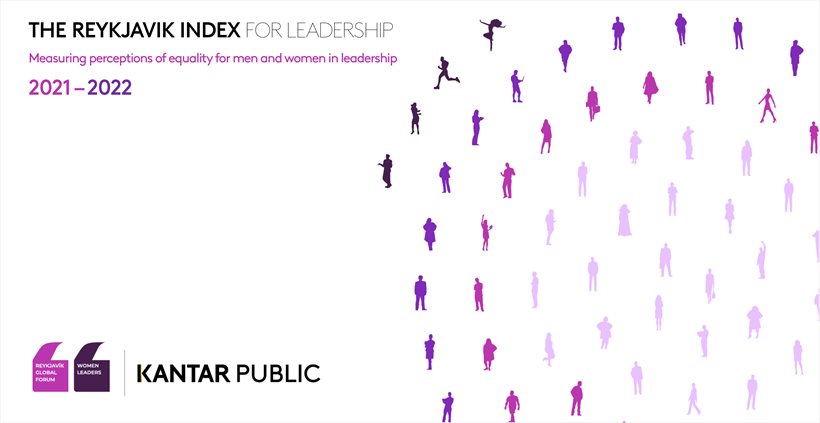
Top stories





EntrepreneurshipHow SMEs can build AI-ready businesses starting with the right technology foundation
Sudesh Pillay, WhyMAcForSME 16 minutes

More news























Logistics & Transport
Uganda plans new rail link to Tanzania for mineral export boost


Created in 2018, The Reykjavík Index for Leadership measures and tracks progress in society’s perceptions of women and men’s suitability to lead across 23 economic sectors. Kantar Public, the world’s leading evidence and advisory business for governments and the public sector, together with Women Political Leaders (WPL), the global network of female politicians, launched the Reykjavík Index for Leadership 2021/2022 at the Reykjavík Global Forum. Based on responses from over 35,000 people, the findings illustrate a continuing failure of the world’s most advanced economies to dispel their societies’ entrenched gender stereotypes.
The 2021 research concludes that societal attitudes have stalled in views of gender equality in leadership. Headline findings from the Index include:
Reykjavík Index for Leadership 2021 scores for the G20+
Across the 22 countries, the Index finds that women and men are both complicit in prejudice about gender and leadership, although not equally. On average, there is a 7-point gap between the scores given by women (71) and men (64) in the G20, meaning that women are more likely than men, to perceive men and women as equally suitable for leadership.
Countries with the widest dissonance between the views of women and men are: Indonesia, South Korea, Saudi Arabia and Australia. The gap in these countries is above 10 points. Conversely, the countries where societal attitudes towards men and women’s suitability to lead are closely aligned include Brazil, Spain and South Africa (with a zero to 2-point gap).
Across all G7 nations, the youngest age group (18-34) reports a lower Index score (69, which is a three-point drop vs 2020) than older generations whose Index scores reach 74 among people aged 35-54, and 77 for the older age group (55-65).
This points to a potential ‘re-traditionalisation’ of both young women and young men across the G7. This generational gap within the G7 countries is especially pronounced in Japan and Germany, with a gap between the younger and older age groups of more than 10 points. With an Index score of only 55, young German men are one of the groups showing the highest gender prejudice across the 22 countries (alongside young men in Indonesia, China, Poland, Russia and Saudi Arabia).
In comparison, the opposite trend can be seen in Iceland where younger people hold more progressive views than their parents – with Index scores of 97 for young women and 93 for young men.
The Reykjavík Index for Leadership ranks 23 sectors for their perceived suitability for both male and female leaders. Media and entertainment remains the sector perceived to be most suitable for gender equality in leadership with an (G20) Index score of 78, compared to a (G7) score of 81. Perhaps reflective of the prominent role women played in fighting the pandemic, Pharmaceutical and medical research is positioned in fifth position in terms of perceptions of equal suitability for men and women to lead, with an index of 76.
While there has been much discussion about the successful response of female leaders to the Covid-19 crisis, Government and politics ranks only at number seven with an Index value of 75. In addition, only 52% of women and 43% of men across the G20 countries would be ‘very comfortable’ having a woman as Head of Government.
Commenting on this year’s report, Dr Michelle Harrison, Global CEO, Kantar Public said: “The continued lack of progress in reducing the equality gap between women and men should be a source of concern across government, the private sector and civil society. Moreover, evidence from this year’s research demonstrates that prejudice is strongest amongst younger people in the G7 group. It’s too soon to say if this is a cohort effect or not, but it points to a risk of increasing prejudice. The Reykjavík Index for Leadership provides the evidence required to better understand these inequalities and inform public policy and private sector interventions to address these prejudices for the future societies we are building.”
Silvana Koch-Mehrin, founder and president of WPL added “The data yet again finds a biased perception. It continues to show sexism towards women in leadership positions across all sectors. There is an urgent need to act in order to reverse this trend. At the Reykjavík Global Forum 2021, we will focus on solutions and on strengthening the community of women leaders. A future with diverse leadership is good for all of society”.
The Reykjavík Index dataset and annual report premiered at the Reykjavík Global Forum and is published at www.kantarpublic.com/inspiration/reykjavikindex and www.reykjavikindex.com.